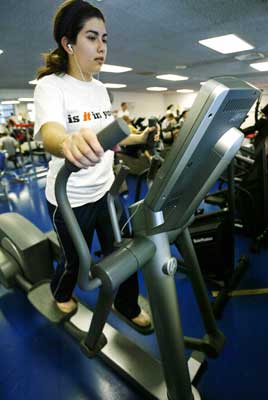Researchers presented studies at a meeting of The Obesity Society on Oct. 22, which were released by CNN.com, concerning weight gain among college students have found that the “freshman 15” can continue throughout the years a student spends at college and most likely into post-college life.
Lisa Eberhart, dietitian for University Dining, said consuming just 150 more calories a day leads to a 15.6 pound yearly weight gain. She also said just one more soft drink per day can cause the weight increase.
“If people do it on a consistent basis — don’t exercise as much or take in a little more food, they’re going to gain some weight,” Eberhart said.
Eberhart said the cafeteria setting of the dining halls “is not conducive to weight loss.”
“The all-you-can-eat part makes it very hard for people to maintain their body weight,” Eberhart said.
“I guess it’s not your mom making you dinner. You go to the dining hall and it’s up to you to decide what to eat and how much,” Raphaelle Davy, a sophomore in business management, said. “You just take as much as you want.”
Quick access to fast-food chains on campus creates unhealthy options for students in need of a hasty meal, according to Adele Gregory, a sophomore in international studies.
“It’s really hard to eat healthy when you’re really busy with classes and fast food is staring you in the face,” Gregory said.
Eberhart said weight gain will most likely continue post-college as well.
“If students won’t go to a gym that’s footsteps away, chances are they’re not going to drive to a gym later.”
Some students have learned how to combat the weight gain that goes along with college.
Ellen Lentz, a sophomore in biochemistry, said she hasn’t gained weight since entering college.
“I’ve kind of stayed active at the same time,” she said. “I play intramural sports, and I go to the gym and run and I play racquetball with my friends.”
“It is important to maintain healthy eating habits and exercise regularly. I am an avid runner and I also participate in fitness classes at Carmichael gym,” Linsi Robinson, a sophomore in communication, said.
Accoring to Eberhart, an increase in weight isn’t automatically linked to a change in diet or exercise routine. It is possible that some students are gaining weight simply because they are getting older.
“They come in as adolescents and leave as adults,” she said.
The increased presence of stress affects students differently in relation to weight.
Robinson said she has become more fit in college.
“Exercise is a great way to relieve stress, she said. “It’s all about getting motivated, setting goals and working toward personal success,” Robinson said.
Ayron McArthur, a freshman in business management, said he thinks stress can play a contributing role in weight gain for some people.
“First, we have the stress of college. Then we get our first test back and we got like a 55,” he said.
McArthur said stress produces cortisol, the hormone the adrenal glands secrete in a person’s body when he or she is stressed, and this can have a negative effect on a person’s performance.
Students have multiple ways to track their health and prevent problems such as weight gain.
Eberhart said “Healthy State,” a campus program concerned with student health, provides booths around campus where students can check their blood pressure, body mass Index, blood sugar and weight. She said the goal of the booths is to encourage students to check and monitor their statistics over the course of the year.
“We are striving to get freshmen to be aware,” she said. ” We want students to leave at the same level or better, instead of fatter and less healthy.”
Students can go to ncsudining.com to access the nutrition facts for campus dining facilities.









